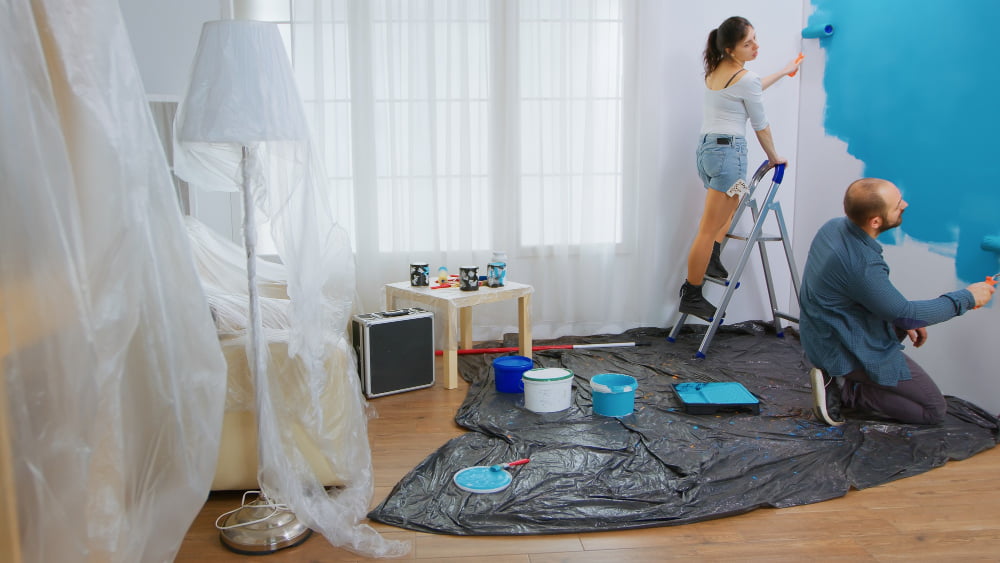Last updated on
It’s happened to the best of us. You’ve started a DIY project with great optimism only for it to dawn on you part way through that things aren’t going quite to plan.
Whether this is a wonky tiling job or a renovation for which we’ve “somewhat” overestimated our ability to complete, it can be tricky to figure out when to plough on and put things right ourselves and when to call in the services of a professional contractor. Use the guide below to help decide which side of the line to come down on, whatever’s gone wrong.
Common DIY Disasters

Prevention is better than cure, so be sure to guard against the most common DIY disasters before making a start on your project. Spilt paint is a common issue, so however small the painting job is, never be tempted to skip the process of covering all floorboards, carpets, and furniture in the vicinity with protective sheets.
Undertaking the work in poor lighting can also be responsible for many avoidable DIY catastrophes. If you can’t see 100% clearly, taking into account how the nature of lighting changes during the day, you’re likely heading for trouble. So ensure the space is properly and consistently lit.
Rushing a project is also a recipe for potential disaster. To avoid this, plan the tasks and their timeframe realistically. Can you really get that major DIY project done in a weekend, for example, or would it be better to book off an extra couple of days from work to ensure you have time to do the job properly, to a high standard, and without an accident-inducing panic?
Getting Professional Help
Depending on exactly what’s gone wrong and its implications, you may well be best calling in the help of a professional contractor. Obviously, if the problem poses an immediate danger, get clear of the vicinity and call in assistance immediately.
If, however, you’ve spent a few days repainting, say, and realize the finish is disappointing because you didn’t prime the walls properly first and have run out of time to redo things, calling in a contractor is a good way of fixing things relatively quickly. Or perhaps you’ve started renovating a room and discovered rotten floorboards or a crumbling lintel – again, professionals are likely to be the answer.
Generally, assess (honestly) your level of competence and the time you have available if you’re considering pushing on and putting things right yourself. Think, too, about whether you have the proper tools to do the job and the cost of buying these tools if not. If you would need to purchase some specialized, expensive kit that you’re never likely to use again, hiring a contractor could be the answer.
When hiring contractors to work in your home, it’s vital to ensure your renter’s insurance has a personal liability insurance coverage element. This provides indemnity in the event that someone suffers an accident or injury while in your home. Get in touch with your provider to find out if you’re covered and how to add this to your existing policy if not.
Reassess Your Plans

Alternatively, and in some cases, you may be best simply reassessing your plans and making some adjustments. Back to that painting example. Perhaps you’re not able to restart and redo the decorating job in every room of your home before going back to work, but you could aim to do two rooms and set aside some time over the coming months to do the rest – perhaps see if you could entice some friends and family members to give you a hand.
Or that tiling job that’s quickly going south? How about ditching your original plans and opting for “faux” tiles instead? These come in sheets that simply adhere to the wall – they look like authentic tiles but are ultra-easy to fit.
The Takeaway: Making Good Can Be Hard to Do
If your DIY project is at the halfway point and you’re disappointed with the results – or are facing outright disaster – then the first thing to do is not panic. Assess the problem, its implications, and your ability to deal with it yourself. Anything that involves electricity or plumbing must be the province of professionals – such jobs involve a significant level of risk to both yourself and your property, so they should not be attempted.
Be really honest and clear about what needs to be done to put things right. Be prepared to get a professional contractor if you won’t be able to complete the project to the standard you want or within the timeframe you have available. If you’re confident that you have the time and skills to do a good job, then go for it…perhaps view a credible YouTube video or two for some handy hints!
Recap:



